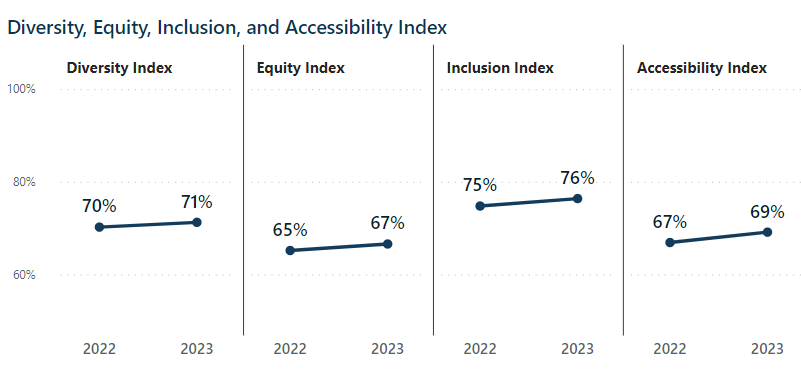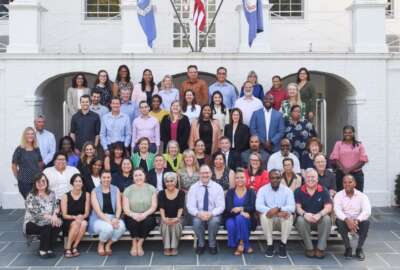Agencies moving toward OPM’s long-term goals for DEIA in FEVS
The Biden administration has set a goal of increasing the DEIA index score in Federal Employee Viewpoint Survey (FEVS) six points by 2026. In the 2023 survey,...
Along with improvements in satisfaction and engagement scores this year, federal employees’ views of their agencies’ commitment to diversity, equity, inclusion and accessibility (DEIA) are also on the rise.
Overall, 71% of feds said they had favorable impressions of their agencies’ DEIA practices, according to the results of the 2023 Federal Employee Viewpoint Survey (FEVS). It’s an increase of 2% from the 69% average score in the 2022 FEVS.
The DEIA component of FEVS is a relatively new addition — the Office of Personnel Management first added the index to the survey just last year. This year, in addition to the overall boost, scores increased within each of the four components that comprise the total DEIA index.

Each section of the DEIA index is composed of a couple of questions related to each of the four categories. 11 of the 13 FEVS questions that ask respondents about DEIA saw increased scores governmentwide this year. The other two questions remained consistent year-to-year.
Within questions on accessibility, for instance, FEVS asked respondents if their organization met their accessibility needs. For 2023, the percentage of positive answers rose from 67% to 70%.
In another example, on the question of whether supervisors give fair promotion and work opportunities to all employees, 71% said yes this year, compared to 70% in 2022.
For the Biden administration, these results are promising. In its fiscal 2022-2026 strategic plan, OPM set a goal of increasing the DEIA index score in FEVS six points by fiscal 2026.
Janice Underwood, governmentwide chief diversity officer at OPM, called the 2% year-to-year increase in FEVS “herculean.”
“These governmentwide results will serve as a baseline to assess future changes, as well as benchmark comparisons for agency DEIA initiatives,” Underwood said during the Chief Human Capital Officers (CHCO) Council meeting on Dec. 12.
Some individual agencies are already further along in their goals for the DEIA index. At the Department of Energy, for instance, employees ranked the agency at 80% on the overall index in FEVS this year.
“We’ve really worked to remove barriers to equal opportunity, to welcome and engage all people and perspectives,” Erin Moore, Energy’s chief human capital officer, said during the CHCO Council meeting. “We also really work hard to ensure our employees feel supported and heard … We offer really strong employee resource groups, which are independent organizations formed by federal staff with diverse demographics such as race, gender, sexual orientation, military status and so much more.”
Some of the employee resource groups at Energy include Blacks in Government, Energy Pride and Energy Veterans.
Additionally, just this past fall, Moore said Energy hosted a “disability mentoring day” to provide more information about the department, federal hiring and federal benefits to hundreds of attendees interested in working for the government.
Of course, the work to improve the DEIA scores doesn’t come from any single person. Moore said she partners closely with Shalanda Baker, Energy’s chief diversity officer (CDO), to strategize ways to improve DEIA within the workforce and at the agency overall.
“The partnership between the CHCO and the CDO is essential to embed DEIA principles throughout the department in a lasting and meaningful way,” Moore said. “Together, we did help to develop and execute our strategic plan for DEIA, where we identified and addressed barriers to employment and retention.”
Within Energy’s recruitment and selection process, Moore said she and her team also implemented a “structured approach” by adding new DEIA-related requirements for hiring managers and others working in the agency’s HR department — and more broadly.
“This included mandatory training on equitable candidate evaluations and unconscious bias training for supervisors and managers,” Moore said.
And beyond the required trainings for recruiters, the agency also routinely offers sessions on topics like accessibility, mental health and section 508 accessibility compliance, Moore said.
The agency also holds targeted outreach events in the recruitment process to reach veterans, military spouses, people with disabilities and individuals in underserved communities.
But for Moore, the work so far is only the beginning. Support from leadership as well as accountability are crucial to improving the metric even further going forward.
“This is a long-term process since what we’re doing is changing work cultures and influencing behavioral habits,” she said. “We will keep identifying initiatives to develop relationships between our leaders and our employees to ensure that they’re based on trust and respect for all. That really is a foundational concept in this.”
Copyright © 2025 Federal News Network. All rights reserved. This website is not intended for users located within the European Economic Area.
Drew Friedman is a workforce, pay and benefits reporter for Federal News Network.
Follow @dfriedmanWFED






